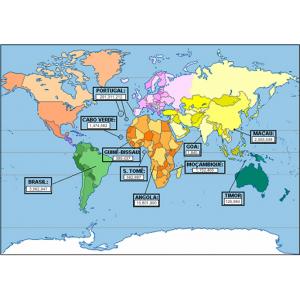Grammar & Resources
The group is centered on modeling linguistic knowledge, integrating interfaces between different areas of grammar and knowledge about how language is put to use. Joint work in formal phonology, lexicon, syntax and semantics allows building an integrated model of grammar, considering how it is represented in the human mind, as well as how it can be computationally modelled; work on L1 and L2 acquisition is at the core of this work. The integration of models of language representation and models of language use is achieved through the study of corpora.
The production of corpora and resources is justified by the goal of developing documentation and providing descriptions of contemporary European Portuguese, but also of understudied contact languages or varieties (Portuguese-based creoles, national varieties of Portuguese in Africa and Asia). The group also produces resources for the study of L1 and L2 acquisition in different settings. The group integrates CLARIN LP.
Research on L1 and L2 acquisition contributes to CLUL’s general purpose of effectively articulating fundamental and applied research, namely in the areas of Educational Linguistics and Clinical Linguistics.
General goals:
- To produce new resources for the study of Portuguese and Portuguese-based creoles;
- To pursue basic research on natural language modeling, integrating knowledge on interfaces between language modules;
- To continue the documentation and description of understudied creoles and new varieties of Portuguese that emerged in a context of language contact;
- To develop the study of language acquisition with an emphasis on language contact situations (see new international Heritage Language Consortium) and on the comparison between typical and atypical development;
- To explore the potential of comparative linguistics in the production of resources for translation and to promote connections with the industry in the area of translation.
Membros
Integrated members with PhD
Integrated members without PhD
Colaboradores
Concluded
| Project | Date | Fin. |
|---|---|---|
| ParlaMint II - ParlaMint II | - | |
| PALMA - Possession and Location: Microvariation in African Varieties of Portuguese (PALMA) | - | FCT
|
| RECAP - RECAP: Resources for Portuguese Learning | - | FCG
|
| CLARIN - CLARIN | - | |
| Documentation of Sri Lanka Portuguese | - | |
| LeCIEPLE - LeCIEPLE - Learner Corpus: da investigação ao ensino de Português Língua Estrangeira/Língua Segunda | - | FCG
|
| Portuguese-based creoles of the Dravidian space: Diachrony and synchrony | - | |
| TAXE - TAXE - Parataxis, Hypotaxis and Interface Syntax-Discourse | - | |
| COPAS - COPAS - Contrast and Parallelism in Speech | - | |
| CLAP - CLAP - Complement clauses in the Acquisition of Portuguese | FCT
|
|
| SynExtract - SynExtract - automatic extraction of synonymy relations for a cost-effective acquisition of language resources | - | FCT
|
| SemiAutLex.PT - SemiAutLex.PT - Semi-automatic construction of relational lexica for Portuguese | - | FCT
|
. (2006). Corpus-based extraction and identification of Portuguese Multiword Expressions. In Actes de la 13eme conférence Traitement Automatique des Langues Naturelles - TALN 2006, April 10-13 2006, Leuven. |
. (2004). Providing on-line access to Portuguese language resources: corpora and lexicons. In Proceedings of the IV International Conference on Language Resources and Evaluation - LREC2004, May 26-28 2004, Lisbon, Centro de Cultural de Belém (pp. 1825-1828). |
. (2003). Reusing resources for the morphosyntactic annotation of a spoken Portuguese corpus. In A. Branco, Mendes, A., & Ribeiro, R. (Eds.), Tagging and Shallow Processing of Portuguese: workshop notes of TASHA 2003. Lisboa: Departamento de Informática da Faculdade de Ciências da Universidade de Lisboa. |
. (2002). An Electronic Dictionary of Collocations for European Portuguese: Methodology, Results and Applications. In Proceedings of the 10th EURALEX International Congress, August 13-17 2002, Copenhagen, Denmark. |
. (2002). Uma análise dos verbos psicológicos com base nos dados de um corpus: regularidade, variação e polissemia verbal. In I. M. Duarte, Barbosa, J., Matos, S., & Hüsgen, T. (Eds.), Encontro comemorativo dos 25 anos do Centro de Linguística da Universidade do Porto (Vol. 1, pp. 21-34). |
. (1993). O corpus e a classificação sintáctica dos verbos. In Actas do Actas do 1º Encontro de Processamento da Língua Portuguesa Escrita e Falada - EPLP 93, Lisboa, INESC, UNINOVA, CLUL (pp. 125-129). |
. (1992). A importância de um corpus para a elaboração de um dicionário. In Textes de la Réunion de travail - Texts of the Final Workshop PROTON I-II, September 21-22 1992, Leuven. |
. (2013). Relativas clivadas em variedades não padrão do português. In Textos Selecionados do XVIII ENAPL 2012 (F. Silva, I. Falé & I. Pereira, pp. 205-227). Porto: APL. |
. (2011). A formação de frases relativas em português oral de Cabo Verde e de São Tomé. In Textos Seleccionados do XXVI ENAPL 2010 (A. Costa, P. Barbosa & I. Falé, pp. 17-34). Lisboa: APL. |
. (2011). Os crioulos da Alta Guiné e do Golfo da Guiné: uma comparação sintáctica. In 7º Congresso Ibérico de Estudos Africanos – CIEA7, painel sobre Línguas crioulas de base portuguesa na África. Lisboa. Retrieved from http://repositorio-iul.iscte.pt/handle/10071/2412" |
. (2010). Uma análise de CP não expandido para o sistema de complementadores do Crioulo de Cabo Verde. In Textos Seleccionados do XXV ENAPL 2009 (A. Costa, P. Barbosa & I. Falé, pp. 111-126). Lisboa: Colibri. |
. (2008). Efeitos de modelização no input: o caso da aquisição de conectores. In Textos Seleccionados do XXIII ENAPL 2007 (S. Frota & A. L. Santos, pp. 131-142). Lisboa: Colibri. |
. (2007). Interrogativas-Q em Crioulo de Cabo Verde: Movimento explícito/implícito ou sem movimento?. In Textos Seleccionados do XXII ENAPL 2006 (M. Lobo & M. Coutinho, pp. 41-55). Lisboa: Colibri. |
. (2006). Processos de relativização e marcadores relativos em Crioulo de Cabo Verde. In Textos Seleccionados do XXI ENAPL 2005 (F. Oliveira & J. Barbosa, pp. 83-95). Lisboa: Colibri. |
. (2005). O Domínio Nominal em CCV: o puzzle dos Bare Nouns. In XX Encontro Nacional da APL (pp. 337-350). Lisboa: Fundação Calouste Gulbenkian. |
. (2004). The Nominal Domain in Santome. In Los Criollos de Base Ibérica: ACBLPE 2003 (M. Fernández & N. Vázquez, pp. 85-100). Madrid/Frankfurt: Iberoamericana e Vervuert. |
. (2002). Pronomes resumptivos e abandono de preposição nos crioulos atlânticos de base lexical portuguesa. In XVII Encontro Nacional da APL (pp. 17-29). Lisboa: Colibri. |
. (2001). Proposta de representação dos DPs relativizados: a análise [NP CP NP]. In XVI Encontro Nacional da APL (pp. 35-46). Lisboa: Colibri. |
. (2000). Reflexões sobre a estrutura dos DPs relativizados: a análise [DP Dº CP] de Kayne 1994. In XV Encontro da APL (pp. 55-74). Braga: Gráfica de Coimbra. |
. (1999). Estratégias de Relativização em Português Europeu: o caso das relativas resumptivas. In XIV Encontro da APL, Braga: Gráfica de Coimbra (pp. 29-39). |
. (2018). Error annotation in a Learner Corpus of Portuguese. In Proceedings of the Eleventh International Conference on Language Resources and Evaluation (LREC 2018). Miyazaki, Japan: European Language Resources Association (ELRA). (Original work published may) |
. (2018). A Lexicon of Discourse Markers for Portuguese-LDM-PT. In Proceedings of the Eleventh International Conference on Language Resources and Evaluation (LREC 2018). Miyazaki, Japan: European Language Resources Association (ELRA). (Original work published may) |
. (2018). Discourse relations with explicit and implicit arguments: The case of European Portuguese aliás. In Proceedings of the Cross-Linguistic Discourse Annotation: Applications and Perspectives, Final Action Conference TextLink. Toulouse. |
. (2018). Multilingual Extension of PDTB-Style Annotation: The Case of TED Multilingual Discourse Bank. In Proceedings of the Eleventh International Conference on Language Resources and Evaluation (LREC 2018). Miyazaki, Japan: European Language Resources Association (ELRA). (Original work published May 7-12, 2018) |
. (2018). A Multi- versus a Single-classifier Approach for the Identification of Modality in the Portuguese Language. In Proceedings of the Eleventh International Conference on Language Resources and Evaluation (LREC 2018). Miyazaki, Japan: European Language Resources Association (ELRA). (Original work published May 7-12, 2018) |
. (2019). How do children interpret novel control verbs?. In Proceedings of the 43rd annual Boston University Conference on Language Development (Megan M. Brown & Brady Dailey, pp. 585-598). Somerville, MA: Cascadilla Press. |
. (2010). Proposta de Classificação Semântica de Unidades Lexicais Multipalavra Nominais. In XXV Encontro Nacional da Associação Portuguesa de Linguística. Textos Seleccionados (Ana Maria Brito, Fátima Silva, João Veloso & Alexandra Fiéis, pp. 81-94). Porto: Edições Colibri/APL. |
. (2011). O Vocativo em Português Europeu: Estudo de Parâmetros Prosódicos em Vocativos com Diferentes Distribuições. In XXVI Encontro Nacional da Associação Portuguesa de Linguística. Textos Seleccionados (Armanda Costa, Isabel Falé & Pilar Barbosa, pp. 1-16). Lisboa: Edições Colibri/APL. |
. (2012). Aquisição das Periferias Esquerda e Direita em Português Europeu. In XXVII Encontro Nacional da Associação Portuguesa de Linguística. Textos Seleccionados (Armanda Costa, Cristina Flores & Nélia Alexandre, pp. 45-65). Lisboa: Edições Colibri/APL. |
. (2013). Acquisition of the Left and Right Peripheries in European Portuguese. In Advances in Language Acquisition: Proceedings of GALA 2011 (Stavroula Stavrakaki, Polyxeni Konstatinopoulou & Marina Lalioti, pp. 4-13). Cambridge: Cambridge Scholars Publishing. |



















































